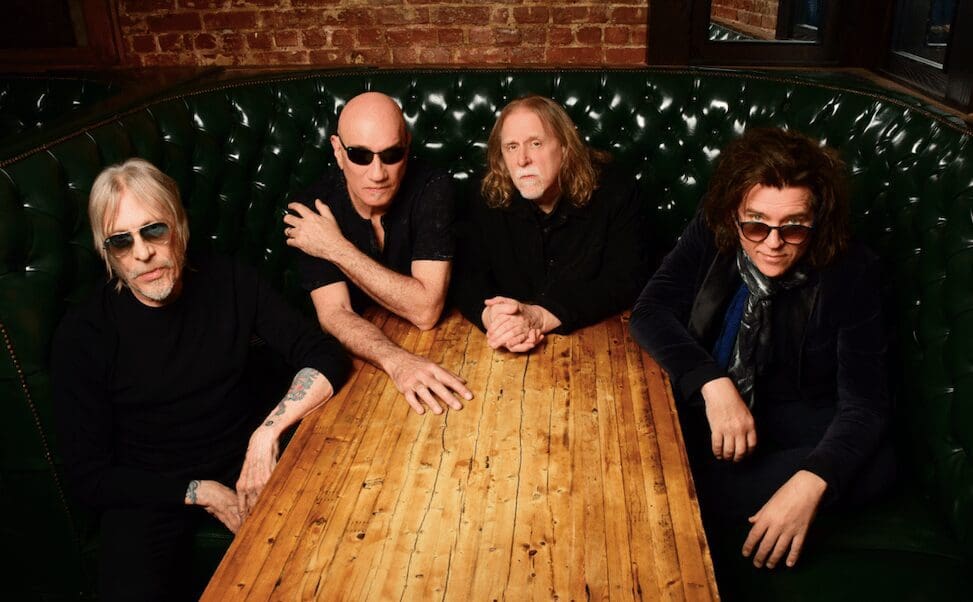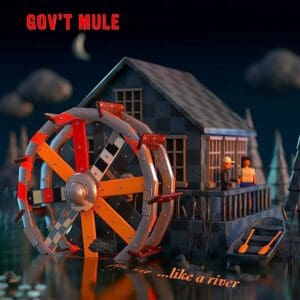
Warren Haynes is an American music institution. A storied career not only with the venerable Gov’t Mule but also as a member of the Allman Brothers Band and The Dead have made Haynes a towering figure, influencing a generation of musicians. The other day he was kind enough to talk to me about the newest Mule record, Peace…Like a River, the history of American music in general, and the blues.
Andrew Howie: If I’m correct here, this record was recorded at the same time as another of your albums. What can you tell me about the differences between these two projects?
Warren Haynes: The previous record, Heavy Load Blues, is our first (and possibly only) blues record we’ve ever done. We’ve talked about it for a long time, but never decided to bring that to fruition until during the lockdown situation. With that in mind, it was really important to me that we made a blues record that would sound authentic, like a lot of my favorites sounded. Of course, the time period that we were kind of being influenced by was mid-’60s to early ’70s; a lot of great blues records came before that, but the sound quality wasn’t quite as good.
So we found where we could set up in two different rooms, different equipment, a bunch of small vintage gear in the small room, no headphones. Just singing through a monitor, everybody extremely close together like at a small club. Then we set up our normal toys in the big room next door with the high ceiling.
Around noon we would go in and record for Peace…Like a River until about nine at night, and then take a dinner break and go next door to The Blues Room and play blues for the rest of the night. That was our schedule every day for several weeks. I wouldn’t normally recommend it, but under the lockdown circumstances, it was the perfect solution to keep ourselves from going nuts.
AH: In the press release for the new record, you mention wanting to focus on the positive aspects of the difficult times in the last couple of years. Can you elaborate on that?
WH: I think everyone kind of came out of this thinking that we all need to take a closer look at what we love and focus more on the things that are important to us. That could be your family, your friends, personal relationships, work, music, whatever fits that bill. We all kind of realized that it’s time to start taking things seriously that mean the most to you.
AH: You’ve been part of groups that have created music many would consider timeless. What do you think goes into making music that can be classified this way?
WH: I think you have to avoid the temptation to create music based on what’s popular at the moment. Just kind of writing and performing what’s in your heart. There have always been and always will be a place for pop music, which is great. The world depends on that. There is also going to hopefully always be a place for music that aspires to go beyond that, and a lot of my favorite music, I feel like, will be around forever because it has this timeless quality that the people who listened to it fell in love with. That’s something I’ve always strived to create and always kind of choose influences that fall into that category.
Music is one of those rare things that is so personal to everyone. Nobody can tell you what to like or not to like. It’s something that connects with an individual listener, there is no reason to question it. I’ve spent my whole life being exposed to a lot of different types of music, and I try to be influenced by the stuff I think is timeless.
AH: You’ve been described as ‘a cornerstone of the American music landscape.’ Do you have any thoughts on that in particular, and more broadly, what makes American music what it is?
WH: I don’t think it’s possible for me to be as objective about my music as other people view it, but as far as American music goes: rock ‘n’ roll is American, blues and jazz are American, country is American, soul is American. All these things started here, and that’s quite a legacy. So American music around the world is revered as being a huge, influential thing, and so it’s important to keep that in mind. When you think about the British blues invasion that influenced American music very dramatically, the great blues artists that came from America, they weren’t as impactful on American audiences at that time as they were on British audiences. These British bands started making music influenced by American blues, and kind of brought that music to the forefront in America in a roundabout sort of way. Everything is a hodgepodge and combination of influences. Fast forward to today with the internet and today’s tech, anyone can access anything at any time, so someone in one part of the world is influenced by another part, and it makes that even more true.
AH: Let’s get back to the new album for just a bit here: tell me a little about these songs. Have they debuted in a live setting? Since the records were written during the pandemic, how did that affect the way they came together?
WH: We just started playing these songs live; we’ve played four or five of them at this point. We will continue adding new tunes to the repertoire. Unlike a lot of our past records, we weren’t able to rehearse or arrange or play any of the new songs live before we went into the studio due to the covid situation. The songs were written during lockdown, and once we felt comfortable being around each other, we went into the studio and rehearsed for about a week, and then spent several weeks in the studio arranging and recording, kind of in a bubble only around ourselves.
We had to spend more time rehearsing and arranging, but that was good because we needed time to get up to speed anyway, since we hadn’t played together for so long at that point. This was in 2021, right in the thick of it.
AH: You’re also no stranger to collaboration, and this record features a whole host of high-profile guest artists. Were tunes written with specific guests in mind or did the music point the way?
WH: Most of the ideas to include the guest performers came as we continued to work on the new material and started to get ideas. We just thought it would be cool to have Gibbons [Billy, of ZZ Top], Thornton [Billy Bob]. Those ideas usually came about midway through the project. Not so much during the writing and arranging, but as it progressed.
AH: Gov’t Mule certainly can’t be pigeonholed into one specific genre, but there is a distinct identity that is intrinsic to your sound. What are your thoughts on musical identity and the effect it has on your musical direction?
WH: We’ve been fortunate that from the beginning, we have just gotten away with what it is that we love to do. In the beginning, Mule was a side project to the Allman Brothers. Myself and Allen Woody were full time, but we had half the year to do what we wanted. The rest of the year was free to do what we wanted. So we started Mule for fun, thinking we were just going to make one record, do one short tour, and go back to business as usual. It kind of grew beyond that. Once we became a bona fide band, we kind of made the decision to, with each other, showcase a little more of our different influences. So now, we’ve made 12 studio records, so at this point, we’ve been able to widen that scope quite a bit and utilize more and more and more of our influences.


